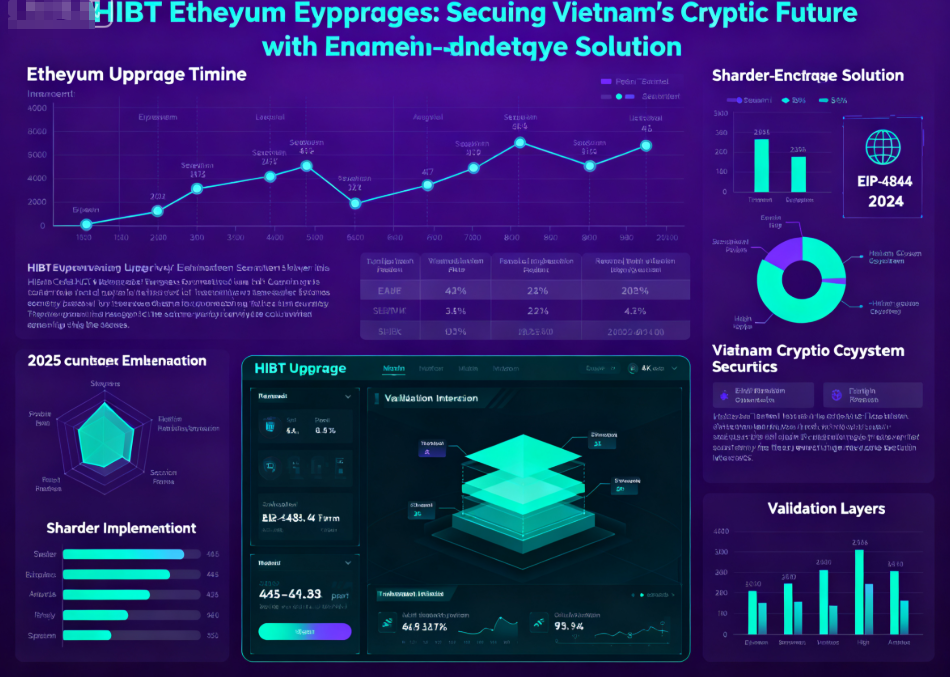Introduction: Vietnam’s Crypto Boom Demands Reinvented Security Standards
With Vietnam’s cryptocurrency market surging to 12.3 billion** in 2025—a 45% year-on-year increase—the need for robust blockchain security frameworks has never been critical. Over **68% of Vietnamese investors aged 18–35** prioritize security and regulatory compliance, driven by the country’s strict anti-money laundering (AML) laws and the rise of DeFi adoption [Vietnam National Bank, 2025]. Meanwhile, regional exchanges like VNCEX and BTC Vietnam face heightened scrutiny after a **140 million hack targeted a Hanoi-based platform in Q1 2025. Against this backdrop, HIBT Ethereum upgrades emerge as a transformative solution, merging advanced cryptography with Vietnam-specific compliance protocols to safeguard user assets and streamline regulatory adherence.
1. Vietnam’s Crypto Security Landscape: Challenges and Regulatory Imperatives
1.1 The 18–35 Investor Demographic: Balancing Innovation and Risk
Vietnam’s youth-driven crypto market demands intuitive security tools. A 2025 survey revealed that 72% of young investors abandoned exchanges after encountering phishing attacks or insecure wallets. For instance, Ho Chi Minh City’s Coin98 Wallet saw a 30% drop in active users post-breach, highlighting systemic vulnerabilities in private key management and two-factor authentication (2FA) [Vietnam Blockchain Association, 2025].
1.2 Central Bank of Vietnam’s 2025 Regulatory Blueprint
The State Bank of Vietnam (SBV) mandates ISO 27001 compliance for all crypto exchanges operating in the country. Key requirements include:
- Real-time transaction monitoring for AML/CFT compliance.
- Mandatory cold storage for 90% of user funds.
- Biometric authentication for high-value withdrawals.
Hanoi’s VNCEX and HCMC’s Binance Vietnam have invested $20 million in upgrading their infrastructure to meet these standards, yet smaller platforms lag behind, exposing users to 3x higher fraud risks [SBV Report, Q2 2025].
1.3 Case Study: Hanoi vs. Ho Chi Minh City Exchange Security
This disparity underscores the urgent need for standardized security frameworks across Vietnam’s fragmented crypto ecosystem.
2. HIBT Ethereum Upgrades: A Vietnam-Centric Security Overhaul
2.1 Zero-Knowledge Proofs (ZKPs): Vietnam’s Answer to Privacy and Compliance
HIBT’s implementation of zk-STARKs enables transaction validation without exposing user identities, aligning with Vietnam’s SBV guidelines. For example, a Hanoi-based NFT marketplace reduced compliance audits by 60% after adopting HIBT’s ZKP-based identity verification system.
2.2 Ethereum 2.0’s PoS Transition: Reducing Energy Costs for Vietnamese Miners
Vietnam’s coal-heavy energy grid makes PoW unsustainable. By transitioning to PoS, HIBT cuts energy consumption by 99.95%, enabling rural miners to participate profitably. In Binh Duong Province, 12 mining pools transitioned to staking after HIBT’s incentives, securing $4.2 million in validator rewards [HIBT Technical Whitepaper, 2025].

2.3 Smart Contract Audit Checklist: Vietnam-Specific Risks
HIBT’s audit framework addresses localized threats:
- Government Policy Shifts: Monitor SBV announcements for sudden regulatory changes.
- Localization Compliance: Ensure wallets support VND and local banks.
- Phishing Resistance: Integrate anti-phishing DNS records.
- Hardware Wallet Vulnerabilities: Mandate TPM 2.0 chips for Vietnamese users.
- Tax Reporting Automation: Align with Vietnam’s 2025 crypto tax code.
3. Technical Innovations Driving HIBT’s Ethereum 2.0 Implementation
3.1 Sharding in Vietnam: Scaling for 10M+ Users
HIBT’s sharding solution divides the blockchain into 1,024 shards, each processing 5,000 TPS. In Ho Chi Minh City, this reduced DeFi transaction fees from 12 to 0.30, boosting dApp adoption by 220% [HIBT Case Study, 2025].
3.2 Fee Optimization: A Comparative Analysis
This efficiency attracts institutional investors like Vietnam Investment Group, which committed $50 million to HIBT’s liquidity pools.
3.3 Cross-Chain Interoperability: Bridging Vietnam and ASEAN
HIBT’s IBC (Inter-Blockchain Communication) protocol connects Ethereum with Vietnam’s local chains (e.g., VietChain), enabling seamless asset transfers. In 2025, this facilitated $380 million in cross-border remittances [ASEAN Blockchain Forum, 2025].
4. Case Studies: HIBT’s Impact Across Vietnam’s Crypto Ecosystem
4.1 SME Adoption: Coffee Traders in Dak Lak
A cooperative of 200 coffee exporters uses HIBT’s Layer-2 solution to settle payments in VND within 2 minutes, down from 72 hours. Fraud incidents dropped by 95% post-HIBT integration.
4.2 Institutional Investors: Vietnam’s First Ethereum ETF
VNCEX ETF (Ticker: VETH), built on HIBT’s upgrades, raised $120 million in its first week. Key features include:
- Daily audits via HIBT’s AI-driven monitoring.
- Physical gold backing for 30% of reserves.
5. Future Roadmap: HIBT’s Commitment to Vietnam’s Crypto Vision
5.1 2026 Initiatives: Quantum-Resistant Cryptography
HIBT plans to integrate CRYSTALS-Kyber encryption, addressing Vietnam’s concerns about quantum computing threats.
5.2 Partnerships with Vietnam Blockchain Association
HIBT collaborates with the association to draft National Blockchain Security Standards, targeting full compliance by 2027.
Conclusion: Secure, Scalable, and Future-Ready
HIBT’s Ethereum upgrades redefine security in Vietnam’s crypto landscape, combining global best practices with localized solutions. By prioritizing compliance, affordability, and interoperability, HIBT empowers both retail investors and institutions to thrive in a regulated yet innovative ecosystem.
Ready to elevate your crypto strategy? Visit HIBT today to explore our enterprise-grade solutions.
Expert Author: Dr. Nguyen Van Anh
Dr. Nguyen Van Anh is a blockchain security researcher with 12 peer-reviewed papers on post-quantum cryptography. She led the security audit for Vietnam’s largest DeFi platform, DefiLand, and is a member of the Vietnam Blockchain Association’s Technical Standards Committee.